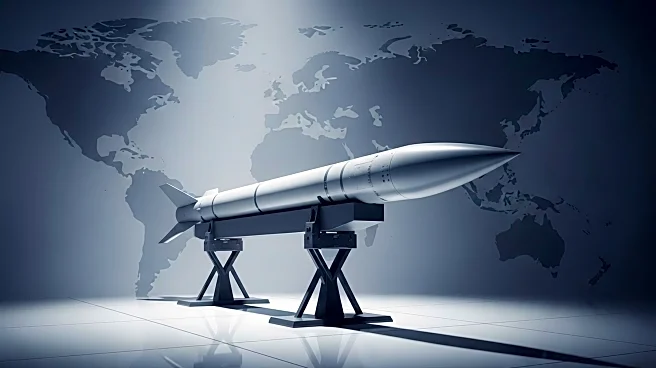What's Happening?
The U.S. Department of State has approved a potential Foreign Military Sale (FMS) of up to 3,350 Extended Range Attack Munition (ERAM) missiles to Ukraine. This sale, announced on August 28, includes additional components such as Embedded GPS/Inertial Navigation System modules and Selective Availability Anti-Spoofing Modules. The funding for this purchase is supported by Denmark, the Netherlands, Norway, and the United States through Foreign Military Financing. The Defense Security Cooperation Agency highlighted the collaboration with NATO allies to develop a scalable system that can be delivered swiftly. Zone 5 Technologies, the primary vendor, bases the ERAM on its Rusty Dagger air-launched cruise missile, which features multiple launch options and advanced navigation capabilities.
Why It's Important?
This sale underscores the strategic military support the U.S. and its allies are providing to Ukraine amid ongoing geopolitical tensions. The ERAM missiles, with their advanced navigation and precision strike capabilities, enhance Ukraine's defense capabilities significantly. This move also reflects the strengthening of NATO alliances and the commitment to collective security. The financial backing from multiple countries indicates a unified stance against potential threats in the region, potentially altering the balance of power and influencing future diplomatic negotiations.
What's Next?
Following the approval, the next steps involve the logistical arrangements for the delivery of the missiles and associated equipment. Ukraine will likely integrate these systems into its military operations, potentially prompting reactions from neighboring countries and influencing regional security dynamics. The U.S. and its allies may continue to monitor the situation closely, assessing the impact of this military enhancement on Ukraine's defense posture and regional stability.
Beyond the Headlines
The sale of ERAM missiles to Ukraine may have broader implications for international arms trade and military alliances. It could set a precedent for future military sales to countries facing similar geopolitical challenges, raising ethical and strategic questions about arms proliferation. Additionally, the technological advancements in missile systems may drive further innovation in defense capabilities, influencing global military strategies.









